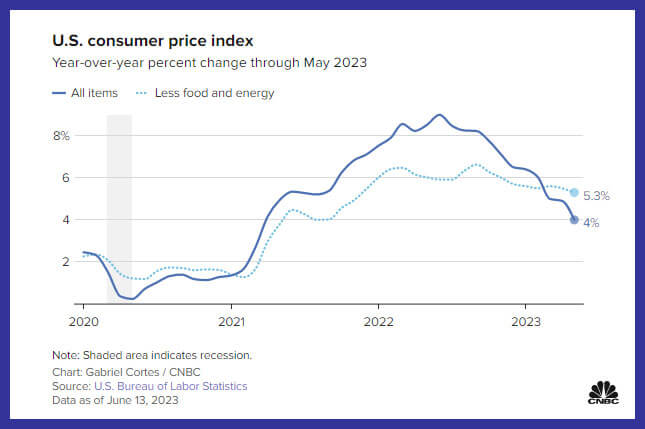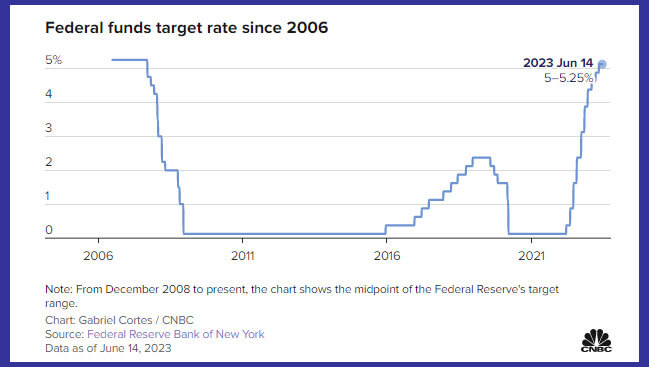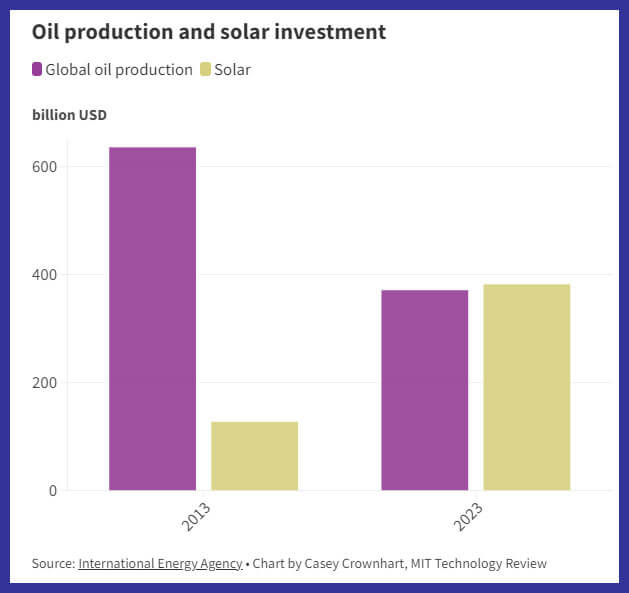Making sense of the markets this week: June 18, 2023
This week, U.S. inflation cools, cruise lines and big tech stocks shine, and oil investors may be in trouble.
Advertisement
This week, U.S. inflation cools, cruise lines and big tech stocks shine, and oil investors may be in trouble.

Kyle Prevost, editor of Million Dollar Journey and founder of the Canadian Financial Summit, shares financial headlines and offers context for Canadian investors.
On Wednesday, the U.S. Federal Reserve decided to pause raising interest rates after 10 consecutive months of hikes and increased pain for borrowers. This decision came on the heels of May’s consumer price index (CPI) report from the Labor Department on Tuesday.
The report revealed the annualized inflation rate now stands at 4%, edging closer to the U.S. Fed’s 2% target, and providing substantial evidence that tighter monetary policy is working. That said, the core inflation measure (which strips out food and energy price movements) was still at a worrisome 5.3%.

Gasoline, health insurance, airline fees, appliances and vehicle prices were all down substantially from a year ago. Whereas food, services and shelter were the main drivers for inflation.
Interestingly, despite the rate pause, U.S. Fed Chair Jerome Powell announced that investors should all expect at least two more quarter percentage rate increases before the end of the year.
“We have raised our policy interest rate by five percentage points, and we’ve continued to reduce our security holdings at a brisk pace. We’ve covered a lot of ground and the full effects of our tightening have yet to be felt.”
Jerome Powell
Clearly, the U.S. Fed is struggling to strike a neutral tone at the moment. It’s not sure whether it needs to reassure the markets in order to prevent a recession, or to scare them away from enthusiastic inflationary spending.

U.S. stocks were up on Tuesday after the CPI announcement, traded mostly flat on Wednesday, and had a strong day again on Thursday.
Everybody knew high interest rates were bad for tech companies.
Those high-growth stock strategies may have worked in the past, but this is 2023. This is the time for “higher for longer” interest rates. We’re calling a six-month recession every three months. The monetary party seems to be decisively over.
Times were so bad for tech in late 2022 and early 2023 that even the perma-tech-bull Cathie Wood started selling shares of chip-king Nvidia (NVDA/NASDAQ) beginning October 2022.
Investors make plans, and the market gods laugh.
So much for the idea that tech was done disrupting, and that it was going to take years before another growth cycle was ready to begin. Tech has been the saving grace for many investors’ portfolios this year.
While the S&P 500 index is up more than 15% so far in 2023, if we were to take out the gains from Apple (APPL/NASDAQ), Microsoft (MSFT/NASDAQ), Alphabet (GOOG/NASDAQ), Amazon (AMZN/NASDAQ), Nvidia, Tesla (TSLA/NASDAQ) and Meta (META/NASDAQ), the other 493 companies are actually down year to date (YTD). (Hence the phrase “The magnificent seven.”)
To put it another way, the tech-tracking ETF QQQ (which follows the 100 largest companies on NASDAQ) is up over about 40% YTD, versus a 3.85% gain for the Dow Jones Industrial Average Index. This is happening against a backdrop of increased debt-servicing costs. Imagine what bottom lines may look like when interest rates begin to come down again.
Most of the USD$4-trillion surge in tech stocks is attributed to advances in artificial intelligence (AI) and the potential for increased productivity. While I’m not prepared to say the rush into tech won’t pull back a bit going forward, I do think there’s enough evidence that AI has more staying power than the vast majority of fraudulent cryptocurrency applications. Moreover, I think the last few months present an excellent example of why having an overall optimism bias is advantageous for investing. While it’s difficult to know where the next advancement in productivity and profitability will come from, betting on expanded efficiency frontiers has always paid off sooner or later.
Canadian investors can also consider the CAD-Hedged iShares NASDAQ 100 Index ETF (XQQ), and can read more about Canadian tech stocks on MillionDollarJourney.ca.
It’s not just the magnificent seven tech stocks that are seeing rocketing profits and investment. Judging by this week’s earnings highlights, most of the sector is going along for the ride. (Numbers in this section are U.S. currency.)
Both companies saw their shares pop after announcing their earnings this week. Adobe was up 5% in after-hours trading on Thursday, and Oracle went into Friday up a scorching 17% this week.
While cruise lines didn’t report earnings this week, Monday’s JPMorgan Chase report on Carnival Cruises (CCL/NYSE) triggered an immediate repricing of the entire industry. Carnival shares were up 14% in early trading on Monday, while Royal Caribbean (RCL/NYSE) and Norwegian Cruises (NCLH/NYSE) caught 3% and 8% boosts respectively.
Goldman Sachs cut its crude oil price forecast by 10% this week, as it looked at decreasing demand from China, and increased supply leaking through from Russia and Venezuela. (All figures are in US currency in this section.)
The investment bank believes a barrel of oil will cost $80 to $86 by December. That would be a substantial increase from today’s $68 to $74 per barrel. We saw oil prices decrease again this week despite the Organization of the Petroleum Exporting Countries (OPEC) only recently announcing voluntary production cuts.
While it wasn’t that long ago that oil companies were booking record profits and handsomely rewarding shareholders, there is no guarantee this trend will continue for the long term. The International Energy Agency (IEA) just released an interesting report with the headline, “The world is finally spending more on solar than oil.”
Here are a few takeaways (numbers in this section are U.S. currency):

This trend of increasing clean energy investment is likely one of the big reasons why we saw the fossil fuel industry focus on efficiency and passing profits along to shareholders, rather than use the latest revenue bonanza to increase exploration and production.
That’s all from me for a few weeks. I am happy to be passing the baton to the ever-capable and classy Dale Roberts, while I get some R&R.
Share this article Share on Facebook Share on Twitter Share on Linkedin Share on Reddit Share on Email